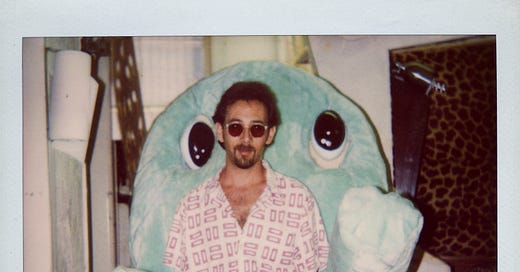Alison Mork Thought She'd Build Puppets. She Became an Icon Instead.
With a new Paul Reubens doc on HBO, the Chairry puppeteer on Pee-wee's Playhouse recalls her time on the show.
Alison Mork’s TV puppetry experience consisted of a live show on a Tennessee PBS affiliate when an offer to work in New York City came in from friend and art director Wayne White. Framing it as a free educational opportunity to her full-time job, she took a leave of absence and showed up, ready to build puppets.
That job would last for four years and five seasons of Pee-wee’s Playhouse, and turned Mork into an icon of millennial children for her portrayal of Chairry.
Mork appears briefly in the HBO documentary Pee-wee as Himself. Matt Wolf’s two-part docuseries is an exhaustive exploration of Paul Reubens’ life and career, from his days as a performance artist and out gay man to his scandal-plagued and closeted later years, all told through Reubens’ own idiosyncratic, teasing, infuriating, baiting talking head interviews and the memories of friends and collaborators. Mork spoke at length with Wolf about her time on the show and her first thought upon seeing the mammoth Chairry puppet: What poor person will have to get in that thing?
“I might actually [have thought], ‘I pity the person who gets in that deathtrap,’” Mork tells me with a laugh. “ I don't even remember how I happened to audition. I remember my audition, but I've never told this to anybody: I think I'm the only one that auditioned.”
The team had Mork cycle through voices for several different puppets, ranging from Chairry to Chicky Baby and Clockey. (Ultimately, she voiced Chairry, Magic Screen, Chicky Baby, a flower, a dinosaur, Chandelier, and Fish’s laugh.) “And I think it was the next day… they weren't ready to hire me, but they wanted to do a screen test with Chairry and they said, ‘You don't have the job yet, but would you mind getting into the puppet and operating it because we wanna see what it looks like on camera?’ And within a couple hours, they say, ‘You've got the job.’”
Mork adds that once Chairry was hers, she fell in love with the puppet. But the role also required a level of dexterity that Mork had to learn on the job, since her puppeteering was “in its infancy.”
“It was a very challenging puppet, because I was doing all of the functions,” she says. “I was operating the mouth, the eyes, which went back and forth, and also blinked. It was all done with levers, so there was a big, humongous foot pedal that would open the mouth, and I had to really slam down on that to get that thing to open.”
The documentary digs deep into Reubens’ private life and the burnout he experienced during the final two seasons of the show. But Mork never saw the full extent of the toll Pee-wee’s Playhouse was taking. “Particularly for me, I only puppeteered on it,” she says, adding that others with more creative input might have a different answer. Just performing was stressful enough; as Mork points out, Chairry is never “dead.” She’s always on camera and always sentient.
Chairry and all the Pee-wee puppets are also a kind of last gasp of weird puppetry, in a way. Mork points out that the ubiquity of the Muppets have transformed our idea of puppets into something similiar to them: fleecy, vaguely human characters. (In fact, after Pee-wee, Mork worked on Sesame Street, where Jane Henson trained her in how to handle the puppets.) The whole experience is a microcosm of what comes across in the documentary, a lost world in which an artist’s big swing was not only successful but also embraced by the mainstream. And all of that is attributable to Reubens’ sui generis talent, one that extended to recognizing the talents of others.
“I'm a person who's self-described as loud and shy,” Mork says. “I was doing artwork for a TV station to being a performer. It's a big leap. It's a big leap, and Paul was really supportive of me. He was a difficult person to get to know because he was involved in every creative aspect of the show. So it wasn't like you're hanging out with Paul, he was too busy. But he was super supportive, and that did a lot for my self-esteem. And also the other puppeteers, and Lynne Stewart. Lynne was fearless. She was so funny and so fearless and so kind. Paul assembled a really great team of people.”




